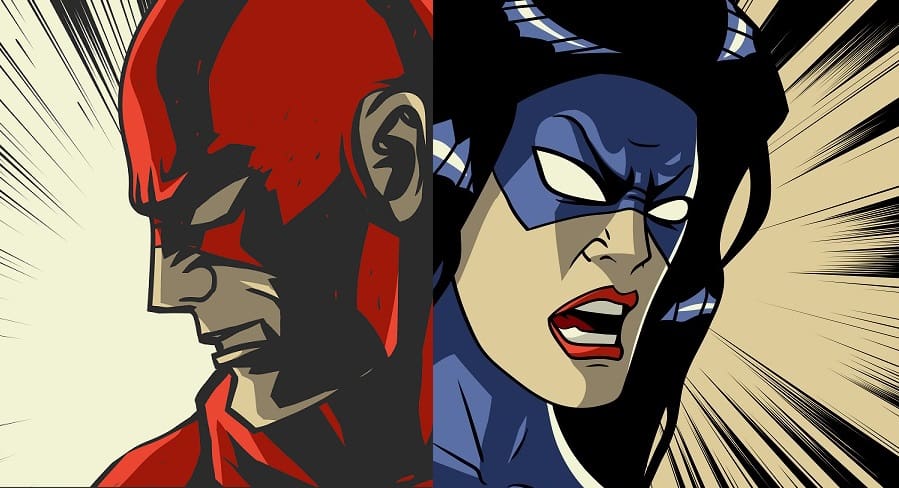Compliance practitioners beware: Following regulations doesn’t always mean you are doing the right or moral thing. Join Sandra Erez in uncovering hidden demons in the rarely seen “dark side” of compliance and hope the day won’t come when you will have to decide which side you are on.
“The only real struggle in the history of the world … is between the vested interest and social justice.”
— Alfred Toynbee, The Origins of World History 1934
For those of us who like to beat the drum of righteous indignation, it is an auspicious and abundant time to indulge our appetites. Exposé media are increasingly taking us behind the scenes and defrocking corporate master chefs of their aprons, revealing to us who is manipulating recipes while feeding us fragile, sugar-spun lies.
We are invited almost daily to public masquerade balls where documentaries rain down on dashing figures, washing away the painted-on faces of corporate responsibility. And although we are a scandal-weary and jaded lot, we are shocked anew each time at how the controls in place have failed us. Boards and management seem oblivious that the souffle of social justice has fallen flat. They are too busy drinking gourmet coffee, freshly ground in shiny corruption makers, while consumers are left with the muddy dregs to share among themselves.
But is noncompliance the culprit, or is there another ghoul afoot? Most, if not all, compliance and risk officers are deadly serious about getting their job done right – and management is certainly diligent in pursuing the guilty.
Take for example, the Nissan CEO Hiroto Saikawa: He was so concerned about fellow Chairman Carlos Ghosn concealing vast sums of money (over $327 million for future pay-outs) that he ordered a 2018 investigation throwing Ghosn under the wheels of the SEC bus. Hmm… good job, everyone thought… until Saikawa was also caught filling his own bank tank with Nissan surplus funds a few weeks ago. Now how silly is that! You would think he would know that long arm of compliance would reach into his 2019 luxury model vehicle, despite its binary intelligence lock.
But (stifling a yawn … seriously, folks, we all know the drill) once the “lack of internal corporate governance” blah blah fanfare dies down, tighter controls are shoved grudgingly into place, and all parties go back to business (or their yachts or prison cells). And despite the loss of brand credibility and investors’ money, no one will summon the riot police, and there are no deaths or injuries relating to these incidents to date. We appear to be safe with our compliance underdog making the world a better place. Or so we thought.
The Bleeding, Dark Side of Compliance
Netflix’s 2018 gripping documentary, “The Bleeding Edge” takes the compliance/regulation juxtaposition and flips it on its hurting head. This extremely well-researched piece portrays a $300-billion-per-year medical tech industry so blindly profit-driven that they have no qualms at putting people implanted with the latest “innovative” medical devices at horrific risk.
The film opens with a pompous emcee at a global medical tech summit exclaiming, “we have broken barriers… and everything we do is a means to the end of unleashing innovation to improve and save lives” – only to reveal a few scenes later that it has been bodies that were broken (not barriers) and some of that unleashed innovation actually improved corporate bank accounts, not people’s lives (sorry, folks, it ruined those).
We are privy to the stories of fairly (formerly) healthy people looking to solve some minor health issues who then watch their health deteriorate as their implants wreak havoc in their bodies: permanent birth control implants splice fallopian tubes, leaving metal splinters that cannot be removed and kickstarting a devastating autoimmune chain reaction, or hip replacements that leak cobalt, which attacks the nervous system to the point where normal daily functioning is almost impossible – these are just a few.
But even as these poor people descend into a vortex of pain and confusion at their medical woes, there is no recourse for them to take, no explanations and no forewarnings of these side effects. Their implant doctors tell them they are crazy, as there is no connection between their sickness and the implants. People remain in the dark until patients-turned-activists turn on the light and speak out on social media. And – despite thousands of complaints and the fact that many professionals, surgeons, doctors and lobbyists in the med tech industry are caring, wonderful people that save lives – the guilty products for the most part remain on the shelves for years until public outcry (including fallout from this documentary) force the industry giants like Bayer to remove them.
When Compliance Cuts to the Quick
Although the word “compliance” is never mentioned during this film, we know it must be lurking in this saga somewhere. After all, it goes hand in hand with its regulatory buddies. So where is it?
The compliance apparition begins to materialize as the documentary progresses. We learn that, in contrast to stricter FDA conditions for the drug approval process, medical devices/implants can be marketed and sold to the public without undergoing a rigorous testing procedure. These shortcuts, known as FDA’s premarket approval and 510K clearance process, are so full of holes that a product can be approved for market even if an equivalent product (previously approved but now no longer) was discontinued because it was proven to be harmful. It is clearly not an issue to be compliant, meet the regulatory legislation and get your product approved quickly.
A Double-Edged Sword: Defining Compliance
Compliance comes from the Latin “complere,” meaning “lacking no parts” (how ironic in this particular context), and the term is defined as conforming, acquiescing or yielding. Now, heaving a sigh of relief, I get it.
Compliance does exist here – just not the good kind. Lawmakers, corporate lobbyists and doctors all with their fingers in the decadent pie been compliant in yielding profit, conforming to an almost absent moral standard and acquiescing to lax regulation so they can feed their greedy appetites. The compliance mystery has been solved: the system is set up so that innovative pace, kickbacks and stock shares take precedent over passing regulations that actually guard people’s health.
Therefore, it stands that in this market segment, the problem is not that there aren’t compliance controls in place or that they aren’t adhered to, it’s that they are. People assuage their guilt by relying on the fact that they are compliant with the law.
A Moral Choice and Challenge: Are You Up to It?
To sum up, time and experience has unwittingly taught us that compliance, never really a hot item on the menu, can often be awarded the status of a friendly ghost – an organization’s very own omnipresent and mostly invisible policeman. Put in place by our regulators to protect the interest of its citizens and ensure a semblance of social justice, it is a kind and innocuous entity that can keep us from harm if we heed its warnings and obey its commands. And, most of the time, there really shouldn’t be any moral dilemma in doing our job.
But for those of us who have a conscience and really care, compliance is about more than just meeting regulations – it’s about doing the right thing. Standing up and speaking out when we see wrongdoing is part of compliance as well – even more so when rules and regulations (corporate or federal) don’t make moral sense. That’s why Netflix’s “The Bleeding Edge” documentary was so unnerving to those of us who truly believe that compliance always plays an important role in the larger fight for social justice. We learned there is a dark and dangerous side to compliance, one devoid of morality and social justice… Is it lurking in the shadows of our own corporations?
Wearing the Compliance Cape: Which Side Are You On?
Compliance practitioners, beware! The swirling cape of compliance is reversible: it can be worn as an expansive, protective garment safeguarding individuals under its vigilant folds, or it can be used to cloak a poor compliance culture of widespread complacency in which risks are underplayed, process is more important than outcome and basic human rights are buried under mounds of profit.
Do us all a favor and uncover YOURSELF as a compliance superhero, a purveyor of truth and fighter for transparency at all levels of your business, even if it scares the living daylights out of you. Play your role with gusto! (No one believes in ghosts anyway.)
Hey, I have an idea… maybe the med tech industry needs to develop a device that acts as an implanted moral conscience. I know a great market for that product… and I can probably get it approved very quickly…











